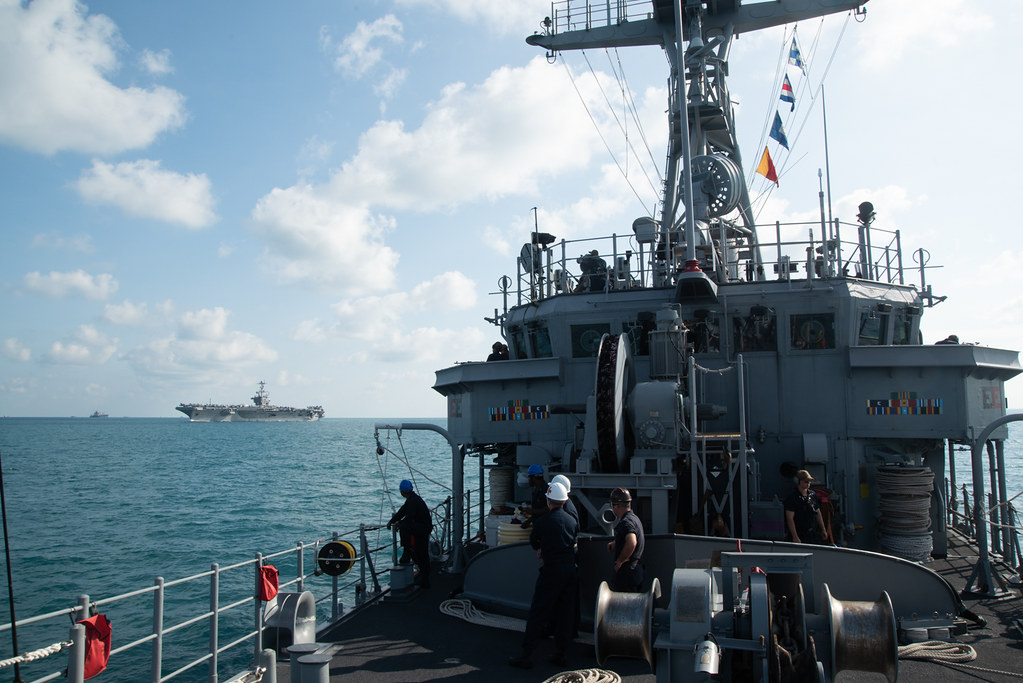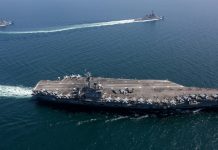
Germany is likely to send a warship in the politically sensitive South China Sea in what constitutes a fundamental challenge to the current line of China’s policy in the disputed region.
Reiterating Berlin’s stand on the growing strategic role of the Indo-Pacific, German Defense Minister Annegret Kramp-Karrenbauer said, Berlin could potentially send a German frigate, from the port of Wilhelmshaven, which will patrol the waters of the South China sea from August this year up to February 2022. The move sees Berling reinforcing the current lineup of European naval assets in the region.
Germany’s announcement received warm welcome in Washington, which was looking for support from its European allies to contain China’s growing belligerent actions in the region and more precisely to maintain and support the principle of freedom of navigation in the South China Sea.
China has tried to dominate the resource waters by militarizing some islands and by unilateral attempting to control shipping routes by deploying huge fleets of fishing ships which act as militias.
The potential move is likely to be welcomed by other local countries in the region, including Japan. Towards the end of 2020, Japanese minister Kishi Nobuo had invited Germany to be part of joint naval exercises.
However it should be noted that not everyone in Germany is happy about sending a warship in the South China Sea. Some German politicians opine that this kind of activity should be the decision of the EU and not that of German authorities. German Greens are particularly concerned about this decision. Interestingly, the defense expert of the FDP parliamentary group, Marie-Agnes Strack-Zimmermann, was quick to emphasize that it is high time that the EU wakes up to the threats posed by China’s unilateral actions.
She went on to note, the Chinese are increasingly cooperating with the Russia in areas that are vital to security in Europe. There is heightened cooperation between both navies.
Following such moves by China and Russia, there is a growing awareness of the strategic role played by the Indo-Pacific region whose security directly translates into the situation in Europe.
It is this growing realization which is pushing German authorities to engage in the Indo-Pacific region. In fact, this concept has been translated into new strategic policy guidelines, which partially call on the German side to “possibly extend its commitment to security” of the area.
Berlin is very aware that Asia’s development in the 21st century is likely to shift the burden of activities including political, military, and economic to this region. Germany is also bold enough to say, “the region becomes the key to shaping the international order in the 21st century”.
France, another European military giant, has deployed the Émeraude submarine in the South China Sea. It has also sent two warships, including FS Tonnere, en route to the region.
The United Kingdom is also expected deploy its aircraft carrier HMS Queen Elizabeth later this year in the region.
Canada has also deployed its naval asset in the South China Sea recently. Its Winnipeg frigate intends to cross the Taiwan Strait, which is even more politically sensitive to Beijing.
Berlin is not concerned with rhetorical reactions coming from the Chinese side. It has taken a more pragmatic stand and intends to pursue economic cooperation with Beijing while it continues to oppose absurd Chinese territorial claims.
Given its economic interests, Germany aims to ensure peace and security in the South China Sea; it is in its interest that shipping lanes are navigable protecting free trade.




